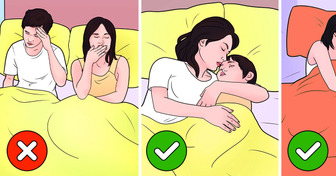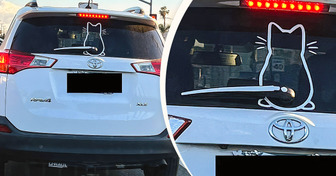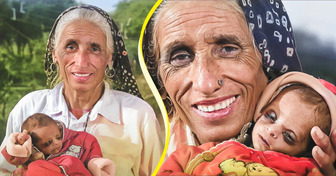16 Celebrities Who Are Equally Successful Today, but Their Backgrounds Are Not Similar at All

Thanks to the books of Astrid Lindgren, we are somewhat familiar with Swedish customs and traditions since childhood. But, in fact, living in Sweden is much more different from what we imagine. It’s not only the motherland of Abba and other successful music artists, such as Avicii and Lykke Li, but also a country that is already living in the future. So, maybe the first visit to Sweden can come as a big surprise for many of us who might be used to different things.
First, Sweden has breathtaking green areas over 90,000 lakes and 3,000 kilometres of sea coastline, which sounds like a perfect place to live. The Swedish metro and its art is famous around the globe and life in general can be very easy to navigate through. And even if you are not interested in all those things, you can just visit the country just to taste the traditional Swedish coffee and foods. Dig deeper into the Swedish culture and find out what things the residents of Sweden like to do and what their living conditions look like.
Baby-care leave in Sweden lasts 480 days, and dads have to spend 90 of them with their newborn. The authorities believe that the father should be involved in the process of raising a child from the very first days of a baby’s life. Therefore, it’s quite common to see men with strollers on the streets of Sweden.
Residents of Sweden go to the supermarket with fabric bags in order not to use plastic bags that are harmful for the environment. And if, for example, the news shows that a factory or farm pollutes the air, water, or keeps animals in adverse conditions, people will stop buying its products.
At the check-out, Swedish people put products onto the conveyer belt in such a way so that it’s easy for the cashier to read the barcodes. It significantly speeds up the payment process. In order to make it easier for buyers to find a certain product, each trolley has a map of the supermarket on it.
Sweden is one of the countries with the highest usage of biofuel in all of Europe. The Swedish zero waste production and recycling system has set an excellent example for the rest of the world. Only 1% of the trash is sent to landfills, 52% of it is used to produce energy, and 47% is recycled. The country is so good at dealing with waste that they even have to import trash from other countries in order to support the work of the companies that produce energy.
There is a tradition in Swedish offices that the residents of this country treat with deep respect. It’s called “fika” or a coffee break. It might seem to be far from being unique because coffee breaks during a hard working day are a norm all over the world. However, in Sweden, residents relate to this process very seriously because one can’t refuse to join colleagues and stay at the desk during a coffee break.
It’s not even customary to answer phone calls relating to work during such breaks. Never, ever tell a man or woman in Sweden that drinking a lot of coffee is bad: they won’t believe you anyway. In the second half of the 18th century, King Gustav III of Sweden conducted a “Coffee Experiment” to prove the negative health effects of coffee. Twin brothers who were sentenced to death were involved in the experiment.
However, the king offered to convert their sentences to life imprisonment if one of the twins agreed to drink 3 pots of coffee, and the other — the same amount of tea, every day for the rest of their lives. Two physicians were appointed to monitor and report the findings of the experiment to the king. Both doctors died before the experiment was completed. Gustav III also died before seeing the final results.
Of the twins, the tea drinker was the first to die, at age 83, the date the coffee drinker died is still unknown.
It’s common to be chatting with a manager of a company or a bank when suddenly at 6 PM sharply you get an auto-response “The working day is over, we’ll get back to you tomorrow” or “We’ll get back to you on Monday.” Locals explain that it’s a respect for their time and personal life.
If there is a 45-minute lunch break at a company, Swedish people will spend exactly this time eating. All because the rules are there to be followed. By the way, companies care not only about mental but also about the physical comfort of their employees. For example, there are shelves for mugs next to code locks.
All disputable and confusing situations are resolved with the help of third parties. If a neighbor keeps turning on loud music at night, a Swedish person will write a claim to the property manager. If a boss doesn’t allow a vacation, the employee will go to the labor union. If there are issues within the family, they will seek help from a family therapist. No matter what kind of unpleasant situation occurs, there will always be a third party that will restore justice.
And in Sweden, the police are called for solving disputes. Here is an example: one immigrant mistakenly mixed up his parking spot with the parking spot of his neighbor. Instead of speaking to the accidental violator directly, they reported the issue to the police. The violator got fined.
Swedish people use the cash-free system called Swish for making purchases. It’s connected to a phone number and bank account. They even have the verb “to swish,” which means “to make a payment” or “to transfer money.”
In recent years, the amount of cash in circulation has rapidly decreased in Sweden. Even public toilets accept payments exclusively from credit cards. By the way, there are LED lights installed on the door handles of the public toilets. Red signals that the stall is occupied, while green shows that it is free.
Each person has a chance to become the supervisor of the national Twitter account of Sweden for a week and get access to making its posts. The goal is simple: to show the country the way its citizens see it. In order to become a supervisor for 1 week, one needs to live in Sweden. The nationality doesn’t matter. You can’t nominate yourself but you can offer someone who, in your opinion, deserves it.
A Reddit user posted this photo and asked, “What is the purpose of these mirrors? I came across them in Trosa, Sweden, near the river. They are on almost every house.” People responded that this strange invention that is usually hung on kitchen windows, near to the table, lets those at the table gossip about things happening outside while having their coffee. For example, to see who visited their neighbor without having to get up from the sofa.
One mother who moved to Sweden and takes her kid to kindergarten shared her impressions on the internet, “The question about sleeping is solved differently. In this kindergarten, those who want to sleep can do it on mattresses, those who don’t want to sleep are not forced to do it. In another kindergarten, the younger kids were taken in strollers to the torch and they would fall asleep there, being wrapped in warm clothes. It would even happen in winter. Perhaps that is even good for health. Swedish people have their own understanding of what is good and what is not.”
Kids can start attending kindergartens from the age of 1 and there are no entry requirements. It’s ok if the baby can’t speak or not potty-trained because many kids are only learning to walk at this age. Kindergarten teachers are mostly women but sometimes you can see men in this position.
On weekends, Swedish people go to stores that offer various interior design objects like vases, cushions, and lamps. They are not used to saving money on original design and coziness here. A Pikabu user shared her surprise on that, “True geniuses of marketing work in Sweden! Instead of utilizing old vegetable boxes, they wrote a nice slogan on them and sell them for 10 Euro each. I saw a woman buy 4 such boxes for designing the interior of her daughter’s room.”
3 million individuals in Sweden are officially members of sports clubs. Winter sports are very popular, but people also play football and basketball, as well as jogging, swimming, walking, and, of course, cycling. At intersections there are special posts with footrests for cyclists.
It means that it’s very easy to travel from Sweden around the world with this passport: you don’t need to get a visa or provide any information about yourself when traveling. Local residents are very proud of the fact that they can visit 170 countries in the world without a visa. The passport ranked 1st place is the United Arab Emirates’, whose residents can visit 179 states without a visa.
The Stockholm metro is famous for the unusual design of its central stations. The city stands on a rocky foundation, so the tunnels are literally hewed into stone. The walls and ceilings of the stations are not veneered here, instead, a unique design was invented for each of them. Moreover, various exhibitions are constantly held in the Swedish metro (such as the exhibitions of kids’ drawings.) Tourists often visit the local subway as an attraction.
Sweden started to experiment with microchips in 2015 and now more than 3,000 people are already chipped in the country. The procedure is simple: they inject a sensor that looks like a thin wire under the skin with the help of a syringe. Various info like data from bank cards and other important stuff is recorded onto the chips. After the procedure, everything can be done with one touch. The cost of the implantation varies from $150 to $200.
The main things about this chip:
Respect for personal space is enormous in Sweden. We no longer get surprised when we see how Swedish residents stand in queues at the distance of several feet between each other. We understand their dislike of small talk with strangers on the streets. But the fact that even your close friends won’t tell you anything not to insult you if you get dirty is still hard to get used to.
Apart from the obvious function such as collecting taxes, the Swedish tax agency has another task — to coordinate and approve the names of newborns. According to the law of 2017, certain combinations of letters cannot be chosen as a name if it is potentially capable of offending someone or causing discomfort to the person. Therefore, no one is named Ikea in Sweden.
An individual is considered to be below the poverty line in Sweden if his monthly income doesn’t exceed 1,000 crowns ($1,270) The prices in this country are high, thanks to social support. Those with less money can have quite a comfortable level of life (a house, an inexpensive car, education.) Rich people, in their turn, don’t feel shy to move on bikes or public transport.
There are many Italian restaurants in Sweden. However, the menu is slightly different from an ordinary one. For example, one of the most popular dishes in Sweden is kebab pizza which is topped with skewered meat and a special sauce. You can also try pizza with bananas at many different pizzerias across Sweden.
The Law of Jante is a code of conduct which is widely known in Scandinavian countries. The 10 rules of the law state:
To see how it works and understand that it is not a manual on how to make you feel worthless in society, all you need to do is to go shopping, to a restaurant, or to a resort in Sweden. You’ll see that the Swedes don’t brag about their material wealth or knowledge, and never try to demonstrate their superiority over others. This is the main message of the rules.
The first ice hotel in the world is located in Sweden and it’s rebuilt annually and opened from December to April. The thick walls, furniture, the bar, and even the glasses are made of ice. The rooms in the “Ice Hotel” are never the same, as different artists and architects from around the world are invited to work on the design of the hotel every year.
The world is so big and so diverse. And it’s so cool that one can get to the other side of the planet within 24 hours now. But it’s a good idea to learn more about the country of destination before going on a trip, not to end up in an awkward situation. When discussion comes to Sweden, what is your perception about the country after learning so many things about it?











